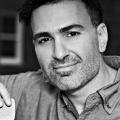Braddock Avenue Books: Many of the stories in Margins of Tolerance depict men testing their personal relationships or investigating their identities as gay men against the backdrop of foreign travel—Peru, Brazil, South Africa. How do you understand the impact of foreign cultures on these ideas?
Eric Sasson: I’m an avid traveler so I feel like I’ve long been fascinated by how travel can shape an individual’s identity. Interacting with different cultures often forces people to think about the things they take for granted back home. The situations my characters find themselves in often highlight or mirror their inner conflicts. The foreign locale strips them of their comfort zone—they have to adapt, or adjust, or confront what’s in front of them—as well as what’s inside them—in a way that they might not be forced to back home.
BAB: In several stories, but especially in “Dear Guy in 24B,” there is often a lack of sophistication on the part of the “straight world” generally—almost like a case of arrested development—but also specifically about, let’s call it, a homosexual aesthetic regarding life.
ES: That’s such an interesting take! I feel like in “Dear Guy” the narrator knows he is projecting all sorts of crude stereotypes onto the man beside him because he feels so guilty about what he’s done and is reaching for justification for his behavior.
I’m unclear about what a “homosexual aesthetic” is. Although there is certainly tension between the straight and gay worlds in the story, it seems to be more of an issue of trust, i.e., now that our society seems to be progressing on gay rights, can we trust that the world has really become more tolerant? I grew up in the 1980s so I suppose I am optimistic but still skeptical. Setting the stories in different countries only highlights this issue—in so many countries in the world today homosexuality is still a crime, so the issues in the U.S. seem tame by comparison.
BAB: There are a handful of stories in the collection that depict not just graphic sexuality, but encounters that are almost devastating in their tawdriness. I’m thinking particularly of “Body and Mind,” where sexual adventure almost becomes an emotional high-wire act.
ES: Almost? Ha! “Body and Mind” was fun to write precisely because of that “eww” factor—I made a point of taking things pretty far (Notes on a Scandal was inspiring in several ways on that front) to ensure that the audience felt what was at stake for this relationship. It’s sort of my Who’s Afraid of Virginia Woolf story. In the end, the title of the collection would make less sense if the readers weren’t in some ways pushing against their own margins, so to speak.
BAB: The writing in Margins has a wonderful energy—I’m always turning the page to find out what happens next. At the same time, however, there is a tremendous atmosphere of loneliness in this book. And it makes me ask myself, “What does it mean to be gay and lonely?” Is there not yet another layer of alienation involved?
ES: Alienation and loneliness are such universal themes in writing—I don’t think being gay and lonely is that different than being straight and lonely. It may manifest itself in a different way, but I do hope the book doesn’t read as an example of “gay” loneliness. The added layer, I believe, comes more from the traveling/being way from home.
BAB: Though my characters live in the “straight world,” I find myself as a reader often drawn to the language and concerns of many well-known homosexual writers: E.M. Forster, Patricia Highsmith, Lytton Strachey. I wonder which writers have most influenced your work.
ES: I always find it hard to answer this question, as straightforward as it may seem. I’ve read reviews of my book where people have compared me to gay writers I’m embarrassed to admit I’ve never read (Andrew Holleran is one) which makes me wonder how much we consciously know about who is influencing us. In the sense that her stories always “matter”—have something important at stake—I love Alice Munro. George Saunders made me believe in the epistolary form, and in never holding back. Salinger made me understand how crucial good dialogue could be. I could go on for hours listing others, and still feel that other people could point out my influences better than I ever could.

